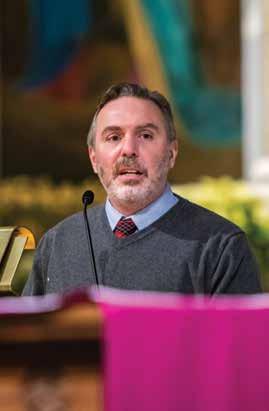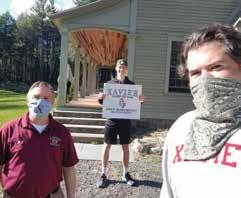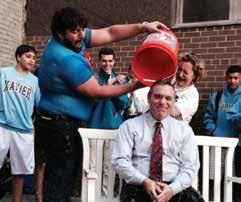
11 minute read
A Teacher at Heart
By ERIC KREBS ’17
New York has seen a lot in the last 15 years: two mayors, four presidents, four governors; the addition of a few dozen new skyscrapers to its skyline; a financial crisis that cost the city 140,000 jobs; a superstorm that inflicted $19 billion in damages; and, now, a pandemic that has thus far claimed the lives of 28,000 of its residents. Through it all, Xavier High
School has had one headmaster: Michael LiVigni P’21. But to everything there is a season, and after 15 summers, autumns, winters, and springs, LiVigni—who became headmaster in 2006—is stepping down from his post. From his tenure, he leaves a legacy of commitment to holistic education, a contagious strive towards selfactualization, a delicate balance of friendship and leadership, and, above all, an unbridled, unashamed love for the craft of teaching. Teaching—and a little fate—is what brought LiVigni to Xavier in the first place. After six years as a history teacher at Canisius High
School in Buffalo, LiVigni returned to New York City, where he grew up, to complete a master’s degree in educational administration at
Fordham University. The spring before his matriculation, then-Headmaster David
Ciancimino, S.J. ’77—who had previously worked with LiVigni when he served as principal of Canisius—notified him of an emergency opening left by a history teacher who had abandoned his post mid-year, an opening that LiVigni could fill. “I say a prayer of thanksgiving for him almost every day,” said LiVigni. “Because of him I got a job at Xavier.” Though LiVigni was a fresh face in the Xavier department known for the enduring nature of its lineup, with six years of teaching under his belt, he was by no means a rookie. “My first impression of Mike was of someone who was well-steeped in Jesuit education, super-well prepared, and an excellent teacher,” said Ed Young P’22, a fellow history teacher and current department chair. “You looked in his classroom, and he had stacks of binders filled with lectures, research, and lesson plans—one of the best-prepared teachers I’ve ever met,” reflected history teacher Chris Stevens ’83, who, at the time, was the department chair and one of LiVigni’s interviewers for the position. After three years on the faculty, LiVigni joined the administration as assistant headmaster. And after three years in that role, he rose to the position of headmaster. Though his rise to headmaster was meteoric—his tenure in the position has been nearly three times the length of both of his prior roles combined—he would never forget his years as assistant headmaster and as a member of the faculty. In fact, those experiences directly shaped his approach to the headmaster position.
In fact, one of his early priorities as headmaster was to get rid of his old position. “Having been the assistant headmaster, I thought it was an impossible job,” said LiVigni, “so I asked to divide that position in half and made it the Dean of Faculty and the Dean of Academics.” Creating the additional post meant that now the jobs of investing in the school’s curriculum and students’ success, as well as the job of developing and advising the school’s faculty, could be given the specialized attention both had long demanded.
In retrospect, this seemingly technical decision is emblematic of LiVigni’s central goal: a dual commitment to delivering the best possible holistic, Jesuit academic experience to students, and doing so by recruiting and developing a faculty wholeheartedly committed to—and adequately trained for—the task.
One early initiative was to overhaul Xavier’s admissions process, which, until that point, had relied solely on entrance exam scores to determine admissions. “That didn’t seem right to me for a whole host of reasons. First of all, I thought it was a terrible exam. Second of all, that’s not what Jesuit education is about,” said LiVigni. Developing a more holistic admissions process which came to incorporate written essays, letters of recommendation, and a deliberative council, LiVigni believes, allowed the school to start looking not only at numbers, but to consider “the people we wanted here.”
As the experience for prospective Xavier students changed, so did the experience for those already enrolled. The last 15 years have seen increased programming in the arts, the introduction of a computer science department, a complete overhaul of the school’s schedule, and increased support for students who find themselves stumbling.
“I think what Mr. LiVigni has been able to do is retain a strong commitment to academic excellence and at the same time continue to facilitate the development of relationships between students and faculty,” said Young. “That happens not just through the academic

After receiving a Bene Merenti Medal for 20 years of service to Xavier, LiVigni gave the Commencement Address to the Class of 2020 last July.

1. 4.



2. 3. 5.

1. LiVigni on a CFX Mexico trip in 2017. 2. Teaching AP U.S. Government and Politics in 2016. 3. Reading How the Grinch Stole Christmas at Christmas at Xavier in 2020. 4. At the 2013 Turkey Bowl. 5. At Xavier’s Breakfast with Santa celebration in 2016.
excellence, but through taking time for the community to have days like Maroon and Blue Day, through his ongoing support of service trips and retreats that put students and faculty in shared experiences in faith and service … he’s really tried to instill in the faculty-student relationships a genuine care for their well-being.”
Of course, LiVigni did none of this alone—and purposefully so. “When I took the Dean of Academics position, I had just finished a job as principal of a middle school, and I came from a community where the principal could do no wrong,” said Luciano Lovallo, LiVigni’s one-time student at Canisius, who has served as dean since 2010. “And Mike has helped me become a better servant-leader for both the parents, student body, and faculty. We can push each to be better, we can disagree and agree to disagree, but out in front always be in lockstep.”
Fundamentally, LiVigni’s investment in Xavier students has always worked as a function of investment in faculty. Over his tenure, he has prioritized the recruitment of top-tier teachers to the school alongside the continued professional development of Xavier’s longtime faculty. This development, in one sense, was technical: ensuring that every teacher had a master’s degree in their subject area, reexamining the curriculum and methods used in the classroom. But it was always personal, too.
“I took the job of headmaster when I was very young … and when I was dealing with a faculty who has not only taught at the school longer than I have, but has taught at Xavier longer than I’ve been alive, you have to deal with that delicately,” said LiVigni. And while most administrators would view a faculty full of veterans—especially in a place as attentive to tradition as Xavier—as an obstacle to reform, LiVigni found it an asset: “Part of the job of a high school administrator is to convince the teachers in the building why your way is the way that we should go, and really what it did was it forced me to be able to articulate for and to justify to myself what I was going to ask them to do.”
“In my heart, I’m a teacher,” LiVigni admitted. But not only in his heart. Throughout his tenure as headmaster, he has remained in the classroom. “I used to always tell him he was nuts for teaching a class. It’s really hard to do that as an administrator,” said Eileen Carty, former Xavier history department chair and current Dean of Students at Gwynedd Mercy Academy High School in Pennsylvania. “But he used to say, ‘You never really know what’s going on at your school unless you’re in the classroom.’ And it’s so true.”
Even now, 15 years later, with LiVigni having hired most of the faculty in the building, that sense of obligation—to the faculty’s expertise, to the craft of teaching, and to the students—has not faded. “He’s a teacher’s teacher. You know he knows what he’s talking about, and you know when he gives you an evaluation that he is your ally,” said Stevens.
“Mike was able to push us forward in regards to updating and reimagining curriculum,” reflected Margaret Gonzalez P’24, who has taught English at Xavier since 1993. “He sees the wonderful potential for this space while keeping the foundations intact.”
One form of potential LiVigni recognized early on—and has realized over his tenure—was the opportunity, and need, to bring gender balance to the Xavier faculty. In 2006, 26% of the Xavier faculty were women. Today, that number is 39%. “I thought it was important for our students to see women in roles of leadership and teaching them,” said LiVigni. “And I think I’ve hired some pretty excellent female teachers … all amazing individuals who are good role models for our guys to follow.”
As in all things, bringing gender parity was not a solitary
2.


1. 3.

1. LiVigni with his son, Matthew ’21, at Maroon and Blue Day in 2019. 2. Delivering care packages to seniors in 2020. 3. Participating in the Ice Bucket Challenge in 2014.
accomplishment, and LiVigni makes his gratitude for the tenacity and expertise of the daughters of Xavier, faculty and staff alike, well-known. “Any committee I served on, any task force I sat on, Mike always made sure that there were female voices,” said Carty, who became Xavier’s first female history teacher when she arrived on 16th Street in 2003. “I was the only woman in the department ... and there was no tolerance for the ‘boys will be boys’ concept. That enables women to speak up, and that came from the top. As a professional, I found my voice at Xavier.”
A friend and a mentor, a teacher and an administrator, LiVigni has managed to balance his responsibility to his colleagues and love for his friends. That doesn’t mean it’s been easy. “The most difficult thing is to say no to people you respect, or to correct people you really like,” said LiVigni. “There’s nothing easy about it but it’s part of the job, and I like to think that when it happens, they understand. I don’t know if that’s true, but I like to believe it is.” In the Ignatian spirit, LiVigni has learned a lot about himself from the position—and especially its struggles. For one, he has an “absolute lack of indifference.”
“And I’m not terribly patient,” he laughed with a tinge of embarrassment, “particularly when I don’t think people are living up to the standards they should be.” That lack of patience comes with a flip side, a ceaseless commitment to doing “whatever I have to do to help someone to get to those standards.”
As an introvert—a historian by training who loves government and art—the public nature of the headmaster’s pulpit hasn’t always been easy, either. “I can’t tell you how many times Margaret Gonzalez has come up to me and said, ‘If you’re not smiling, no one is smiling, so do something about that,’” he laughed. LiVigni, still, after 15 years at Xavier’s helm, doesn’t quite understand why people look to him for cues, for guidance. But they do, in almost every circumstance.
“He cares for the faculty so deeply and our happiness means a great deal to him,” reflected Colleen Rober, a Spanish teacher at Xavier since 2010. “Mike is always, and I do mean always, available to us when we need him, whether the issue at hand is related to our vocation or not. He has been a source of comfort to me through several trying moments and also a dear friend during times of celebration.”
So much of Mike LiVigni’s legacy is his desire to listen, to have an open-door policy and mean it. But he also knows how to talk. “There is not a more passionate, better public speaker that I know,” said Stevens, thinking specifically of this year’s Ignatian Scholars reception night. “Mike goes through the five points of the Grad at Grad, and that can be sleepy stuff, but by the end of his speech, I was ready to go to war.”
“He always knew the right words. He could always capture the moment, he could connect with teachers and students alike, and that doesn’t happen everywhere,” said Carty.
The passion LiVigni emanates, for generations of Xavier students and faculty alike, has brought life to receptions, assembly meetings, and services; that passion, for LiVigni, can also be tongue-tying. “Sometimes I look out and think, ‘There is nothing I could ever tell this group of people that could ever communicate to them how important they are not just to me, but to the world.’”
But even when words fail, actions prevail. Mike LiVigni, for 20 years, has shown Xavier exactly how much it means to him. “Perhaps ‘loving’ is the word that describes Mr. LiVigni more than anything else. He loves his family, he loves his colleagues, and he loves Xavier,” said Rober.
“And I know that I can say, proudly and without hesitation, that Xavier will always love Mike LiVigni.”
Eric Krebs ’17 is a writer and rising senior at Yale University.






